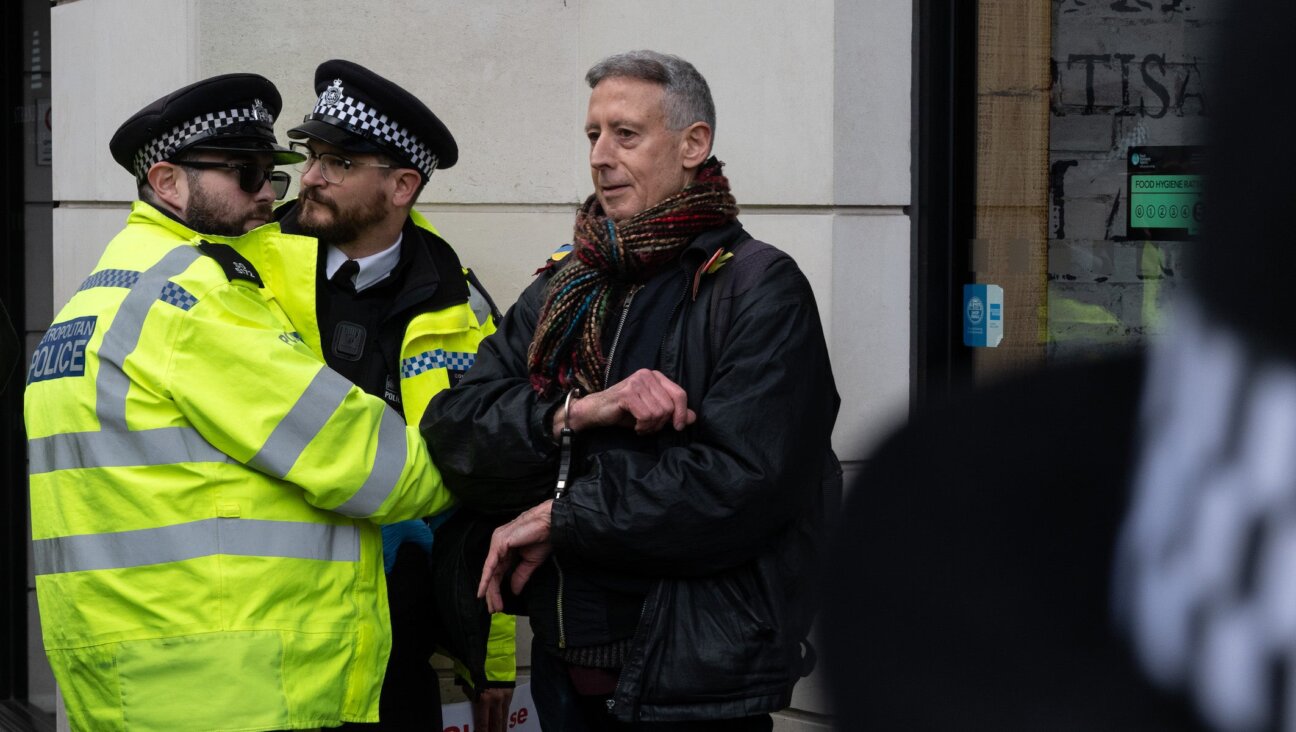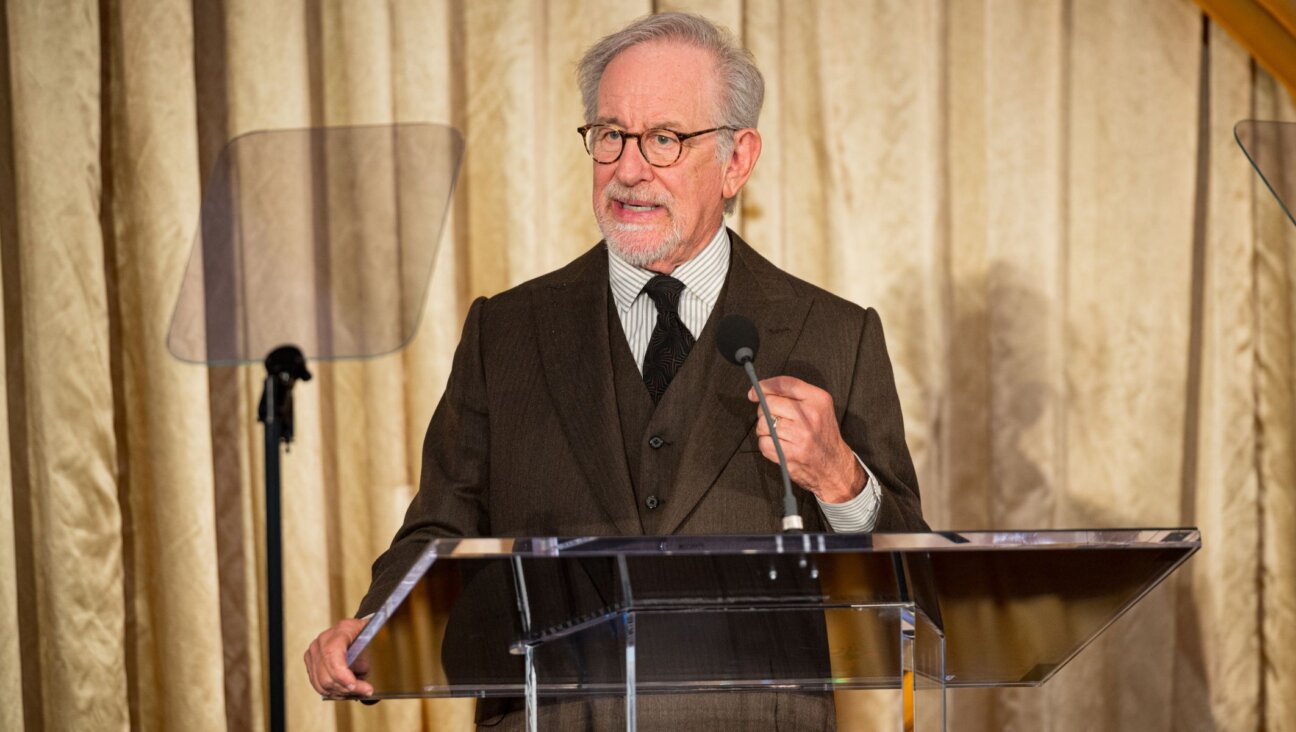Nazi-Looted Artwork At Issue in NPR Flap
National Public Radio has suspended a veteran New York arts journalist indefinitely after he prepared what the network called an unfair report on the prestigious Museum of Modern Art.
The report, by freelance journalist David D’Arcy, focused on a legal struggle for control of a painting looted by the Nazis from a Viennese Jewish art dealer.
The painting, “Portrait of Wally” by Egon Schiele, was loaned to the museum in 1997 by an Austrian foundation that acquired it after the war. Spotted by relatives of the Viennese art dealer, it was impounded in 1998 by the New York district attorney. It is now in federal custody. The museum, which is chaired by cosmetics heir and Jewish communal leader Ronald Lauder, has sought to dismiss the federal attempt to impound the painting, which prevents the painting’s prompt return to the lender.
The report was aired December 27, 2004, on NPR’s “All Things Considered.”
D’Arcy, a freelancer who had reported for the network for 21 years, was suspended a month later following allegations that he failed to let the museum present its views that he had misused a quote by Lauder.
Lauder is treasurer of the World Jewish Congress and chairs the WJC’s Commission for Art Recovery.
D’Arcy insists his report was fair and accurate. His supporters, who reportedly have flooded the network with complaints, claim the network caved into pressure from MoMA.
NPR denies it “fired” D’Arcy. Spokeswoman Susan Burser said the freelancer has been “suspended” because he violated “basic editorial standards of journalism.”
The issue began this past December when editors at NPR asked D’Arcy to prepare a report on MoMA’s reopening. His report focused on the seven-year-old legal battle between the family of late Viennese art dealer Lea Bondi and the painting’s current owner, the Leopold Foundation.
The foundation, supported by the Austrian government, lent the painting to MoMA for a 1997 Schiele exhibition. After Bondi’s heirs sought to reclaim it, a complicated series of legal battles ensued, leading to its impounding in 1998 by District Attorney Robert Morgenthau. Later it was determined that Morgenthau overstepped and lacked jurisdiction.
The U.S. Attorney for the Southern District then took over, claiming jurisdiction because of a federal law that protects visiting artworks from legal entanglement. The case is still pending. The painting, now worth an estimated $10 million, remains locked away in a federal warehouse.
MoMA maintains it has not taken sides on ownership. A museum spokeswoman referred a reporter to a written statement from MoMA’s general counsel, Stephen Clark, stating that “MoMA sympathizes with the ownership issues” but that from the museum’s standpoint, “the question of ownership has not yet been legally determined.”
In a court filing in 1999, obtained by the Forward, MoMA sought dismissal of the federal government’s action to impound and submitted evidence asserting that “the Leopold Foundation has a genuine claim to ownership,” though not taking a definitive position on the issue.
D’Arcy has reported on the controversy several times over the years. According to a transcript, his December 27 report opened with a taped quote from Lauder, who is described as “founder of the Commission for Art Recovery, which has urged museums around the world to search their collections for art looted from Jewish families in the Nazi era.” In the transcript, Lauder restates that position, saying that if stolen works are identified, “the priority should be to return them to the family that owns them.’’
The transcript states that Lauder was speaking at the museum’s November 2004 reopening.
The report, which D’Arcy says was closely edited and monitored by NPR, went on to say that none of the key players, including MoMA, the U.S. Attorney and the Leopold Foundation, had agreed to be interviewed for the story.
It quoted several experts and lawyers, some of them critical of MoMA. One of the critics, noted art-world lawyer Tom Kline, told the Forward that the “museum for seven or eight years has been digging in its heels and saying, ‘no way, no how,’ rather than being any kind of intermediary… to bring some rationality.”
The report also quoted an art expert who said seizures of visiting works would have a “chilling effect” on future loans.
Almost immediately after the broadcast, MoMA officials complained to NPR that D’Arcy’s report included inaccuracies. A MoMA spokeswoman, who spoke on condition that she not be named, confirmed that the museum made a complaint but declined to elaborate.
At first, it seems NPR stood by the story. D’Arcy told the Forward that he received a call in the first week of January from a midlevel NPR editor who advised him that MoMA had challenged his story, complaining, D’Arcy said, that he never contacted them for comment. The museum also reportedly alleged that D’Arcy essentially took Lauder’s quotes out of context, a charge he emphatically denies, and that the report suggested the painting was in the museum’s possession rather than stored in a federal facility. D’Arcy denies his report made any such suggestion.
D’Arcy said the NPR editor backed him up. The editor, whose name is being withheld because he could not be reached for comment, “realized that of course I contacted them and asked them to tell their part of the story,” D’Arcy said. “He defended the piece. He was proud of it.”
According to D’Arcy’s lawyer, David Korzenik, the issue resurfaced two weeks later. It is not clear whether MoMA complained a second time; Korzenik said there is some evidence that the renewed interest came from NPR management. Korzenik said the network demanded backup material from D’Arcy to support his story. He provided some and was compiling more, Korzenik said, when two NPR managing editors, Barbara Rehm and William K. Marimow, phoned and questioned him.
According to D’Arcy, Rehm accused him of “shabby journalism” and said he made Lauder “look like a hypocrite.” D’Arcy said the editors chastised him for using what they took to be a generic quote from Lauder about looted art instead of questioning the chairman directly.
In January, a month after the report aired, NPR broadcast a correction stating that “the government, not the museum, has custody of the artwork. The museum says it took no position on the question of the painting’s ownership.” It also said that “NPR failed to give the museum a chance to answer allegations about its motivations and actions.”
D’Arcy has insisted he gave the museum ample opportunity to comment but the museum declined. Museum officials have denied this, but declined further comment. “We consider this an issue between NPR and David D’Arcy,” a spokeswoman said.
A few days later, Rehm called D’Arcy again. This time, he says, he was given the boot. “I’ve been told by NPR that I’ll never eat granola in this town again,” he said. D’Arcy’s immediate editor at NPR, Tom Cole, was also disciplined, reportedly suspended without pay for one day.
In the months since D’Arcy’s last telephone conversation with Rehm, the controversy over NPR’s handling of the matter has escalated. Television journalist Morley Safer accused NPR, according to published reports, of succumbing to “intimidation by a large, wealthy and powerful cultural institution.”
NPR says it stands by its decision. In March, NPR ombudsman Jeffrey A. Dvorkin, responding to complaints, issued a report upholding the network’s handling of the matter. “The original report did not, in my opinion, fully and accurately present all of the facts,” Dvorkin wrote. “Nor did it present MoMA’s position on the ownership question.”
Some of D’Arcy’s supporters contend that the Dvorkin statement only fanned the controversy. “To the extent that… [D’Arcy] was disciplined for a bad story, that’s troubling,” said Kline, the art lawyer. “To the extent that the story was corrected based on misinformation, it’s especially troubling. To the extent that comments by me and others have not been directly addressed, it’s even more troubling. So it’s a story that’s sort of gotten worse as it goes ahead.”
D’Arcy’s relationship with NPR remains in a kind of limbo. Korzenik said he and his client are still taking stock, trying to determine whether to pursue legal action against the network, and what sort.
NPR seems equally uncertain. According to spokeswoman Bruser, D’Arcy remains technically on indefinite suspension. “I don’t know what the time frame is,” she said. “I don’t know whose court the ball sits in, whether it’s Mr. D’Arcy calling NPR or NPR calling Mr. D’Arcy.”
















